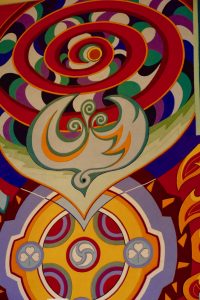HOMILY EASTER SEASON WEEK 02 01 – Year II
On Being Spirit-filled, Healing Witnesses
(Acts 4:23-31; Ps 2; Jn 3:1-8)
********************************************
A young lady brought her fiancé to church for mass. He was full of questions which she tried to answer, such as what is a holy water font; why genuflection; what were the statues, what is a tabernacle? Then the priest took off his watch and placed it on the lectern just as he was about to begin his homily. When he asked what that meant, she replied, “Not a darn thing!”
Today, the readings invite us to be spirit-filled healing witnesses to the resurrection of Jesus from the dead.

Mural in Freemantle, AUS
There is a shift in the readings this second week of the Easter season, from the appearances of Jesus to a focus on the Holy Spirit, which is appropriate as we approach the celebration of Pentecost. In fact, the first reading appears to be a second Pentecost event, with the house this time being shaken, the believers again filled with the Holy Spirit, and again they “spoke the word of God with boldness.”
In the Gospel, Jesus informs Nicodemus he cannot see the kingdom of God unless he is reborn of water and the Holy Spirit. That could mean for Catholics especially, baptism and confirmation. For others, it means a conversion experience in which they actually feel the presence of the Spirit manifesting itself within, sometimes leading them to a radical change of behavior. That is more common among converts, as Catholics tend to be nurtured in the faith and grow within it, in a less dramatic fashion.
The Spirit figures prominently in the first reading. First of all, it is the Spirit of God that prophesied through King David the hostility Jesus would face leading up to his crucifixion. Filled with the Holy Spirit, the apostles praise God for sending Jesus whom they call Messiah, Anointed One, the Christ, the Risen Lord, the holy servant of God.
It is this proclamation of who Jesus is, and their prayer for the power of his Spirit, that allows them to proclaim the Word of God boldly, and to heal, or perform signs and wonders in the name of Jesus.
The message is quite clear – as followers of Jesus and members of his Body, the Church, we are to pray for the Spirit to make us healing witnesses to the resurrection. The Spirit is that mysterious presence moving us to do acts of kindness and generosity when we could just as easily walk away. The Sprit is the One who helps us forgive a long-standing hurt even though the wound still stings. And the Spirit is the one who can give us courage to share our faith with others despite an inner reluctance and hesitation.
Healing may seem to some to be a bit esoteric, but as Richard Rohr points out in his meditations, a retreat without some form of transformation is to settle for a religious externalism. He holds that for every retreat a person does, there should also be a “confront,” a purposeful dealing with some issue, some dark side of one’s personality, some social problem that will demand some change on the part of the retreatant.
Bishop Robert Barron picks up on that note and claims Jesus is speaking with great directness here about metanoia, about the change of attitude required before one is capable of living in the energy of the Incarnation. Jesus senses that Nicodemus, the great “teacher of Israel,” is caught in the net of ego concerns, still clinging fearfully to his power and status, still exulting in his grasp of the religious traditions of his people.
And Jesus’ concerns are confirmed by the almost comic rationalism of Nicodemus’ response to his invitation to rebirth: “How can a grown man be born? Can he go back into his mother’s womb and be born again?” While Jesus speaks the evocative and analogical language of the soul, Nicodemus hears with the ears of the ego, the rational power that wishes to know clearly and control. It is precisely that fearful rationalism which Nicodemus must abandon in the painful process of rebirth and reconfiguration of the soul.
The Eucharist is itself an experience of God’s unconditional love as forgiveness and healing that leads to transformation. We who participate sincerely and with faith are transformed into the Body of Christ, and sent out into the world to be Spirit-filled healing witnesses to the resurrection.




It is another wonderful message and reflection relating to believing the Holy Spirit and healing process. If we experience God’s unconditional love is forgiveness and healing then it will transform us into the body and blood of Christ. This depends how strong is our faith ; are we willing to put our lives in God’s hands by letting him do unto us. Do we want to be stubborn, selfish, bitter and have a grudge. To move forward and be closer to God ; we should let go of all negative thoughts and resentments . We should ask God to forgive us for all sins or faults so that we would be healed. He will lead us to transformation; so that we will be spirit filled healing witnesses to the resurrection. Amen. Praise to you lord Jesus Christ.
It is a blessing to experience spirit filled healing as a belief. It is beautiful as Holy Spirit descends up us during the Pentecost . We receive the gifts from the Holy Spirit. Amen. Amen. Thanks Bishop Sylvain Lavoie ??????????❤️❤️?